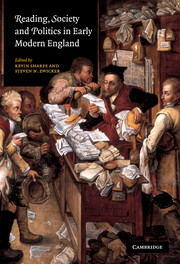Book contents
- Frontmatter
- Contents
- List of illustrations
- List of contributors
- Acknowledgements
- Introduction: discovering the Renaissance reader
- Part I THE MATERIAL TEXT
- Part 2 READING AS POLITICS
- Part 3 PRINT, POLITICS AND PERFORMANCE
- Part 4 READING PHYSIOLOGIES
- Part 5 READING IN THE TIME
- 9 Martial, Jonson and the assertion of plagiarism
- 10 The constitution of opinion and the pacification of reading
- 11 Cato's retreat: fabula, historia and the question of constitutionalism in Mr Locke's anonymous Essay on Government
- Index
11 - Cato's retreat: fabula, historia and the question of constitutionalism in Mr Locke's anonymous Essay on Government
Published online by Cambridge University Press: 22 September 2009
- Frontmatter
- Contents
- List of illustrations
- List of contributors
- Acknowledgements
- Introduction: discovering the Renaissance reader
- Part I THE MATERIAL TEXT
- Part 2 READING AS POLITICS
- Part 3 PRINT, POLITICS AND PERFORMANCE
- Part 4 READING PHYSIOLOGIES
- Part 5 READING IN THE TIME
- 9 Martial, Jonson and the assertion of plagiarism
- 10 The constitution of opinion and the pacification of reading
- 11 Cato's retreat: fabula, historia and the question of constitutionalism in Mr Locke's anonymous Essay on Government
- Index
Summary
There are books that are of the same chemical composition as dynamite. The only difference is that a piece of dynamite explodes only once, while a book explodes a thousand times.
Yevgeny ZamiatinIn the autumn of 1689 London publishers Awnsham and John Churchill offered up a timely, if badly printed, anonymous tract that would long outlive the concatenation of hands and purposes that first gave it life. Two further anonymous editions followed, in 1694 and 1698. With the fourth edition of 1713, nine years after the death of its author, the official fame of the Two Treatises of Government accelerated apace as the work of the celebrated philosopher John Locke. Over the next two centuries, the second of the treatises accumulated its modern reputation as a freestanding whole. Severed from the first initially in the French translation of 1691, under the title Du gouvernement civil it saw seven further French language editions between 1724 and 1790. With successive waves of translation from the French it developed a life of its own in a variety of European vernaculars – German in 1718, Italian in 1773, Spanish in 1821, Russian in 1902. Thus associated with an unfolding history of European revolutions and popular agitations, the Second Treatise has few rivals as a paradigm case of exploding print.
Like The Prince, The Social Contract and The Communist Manifesto, it was endlessly reprinted, embraced and repudiated by generations of readers, marshalled to illuminate the dilemmas of disparate political presents.
- Type
- Chapter
- Information
- Reading, Society and Politics in Early Modern England , pp. 317 - 350Publisher: Cambridge University PressPrint publication year: 2003
- 8
- Cited by



